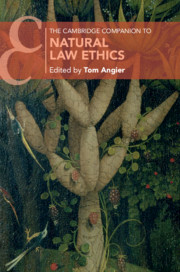Book contents
- The Cambridge Companion to Natural Law Ethics
- Other Volumes in the Series of Cambridge Companions
- The Cambridge Companion to Natural Law Ethics
- Copyright page
- Contents
- Contributors
- Introduction
- Part I The History of Natural Law Ethics
- Part II The Revival of Natural Law Ethics
- Part III Natural Law Ethics and Religion
- Part IV Applied Natural Law Ethics
- Part V Natural Law Ethics
- References
- Index
- Other Volumes in the Series of Cambridge Companions (continued from page ii)
Introduction
Published online by Cambridge University Press: 21 October 2019
- The Cambridge Companion to Natural Law Ethics
- Other Volumes in the Series of Cambridge Companions
- The Cambridge Companion to Natural Law Ethics
- Copyright page
- Contents
- Contributors
- Introduction
- Part I The History of Natural Law Ethics
- Part II The Revival of Natural Law Ethics
- Part III Natural Law Ethics and Religion
- Part IV Applied Natural Law Ethics
- Part V Natural Law Ethics
- References
- Index
- Other Volumes in the Series of Cambridge Companions (continued from page ii)
Summary
Natural law ethics is a normative theory, which, as its name implies, centres on two key notions: nature and law. It is animated by the idea that nature, and human nature in particular, is the source and ground of the moral laws (or, more widely, moral norms) which govern our nature. Historically, the ‘nature’ component was first theorised in Ancient Greece and Rome, where philosophers argued that human beings are intrinsically directed to and fulfilled by certain ends – the claim of natural teleology. The ‘law’ component found its most pronounced embodiment far earlier, in the scriptures of Ancient Israel, which proclaim a binding set of moral commandments that issue from a transcendent deity. The history of natural law ethics is, put broadly, a mediation between these two cultural inheritances – and is therefore the site of several recurrent controversies. How, exactly, are moral norms embedded in nature?
- Type
- Chapter
- Information
- The Cambridge Companion to Natural Law Ethics , pp. 1 - 8Publisher: Cambridge University PressPrint publication year: 2019

